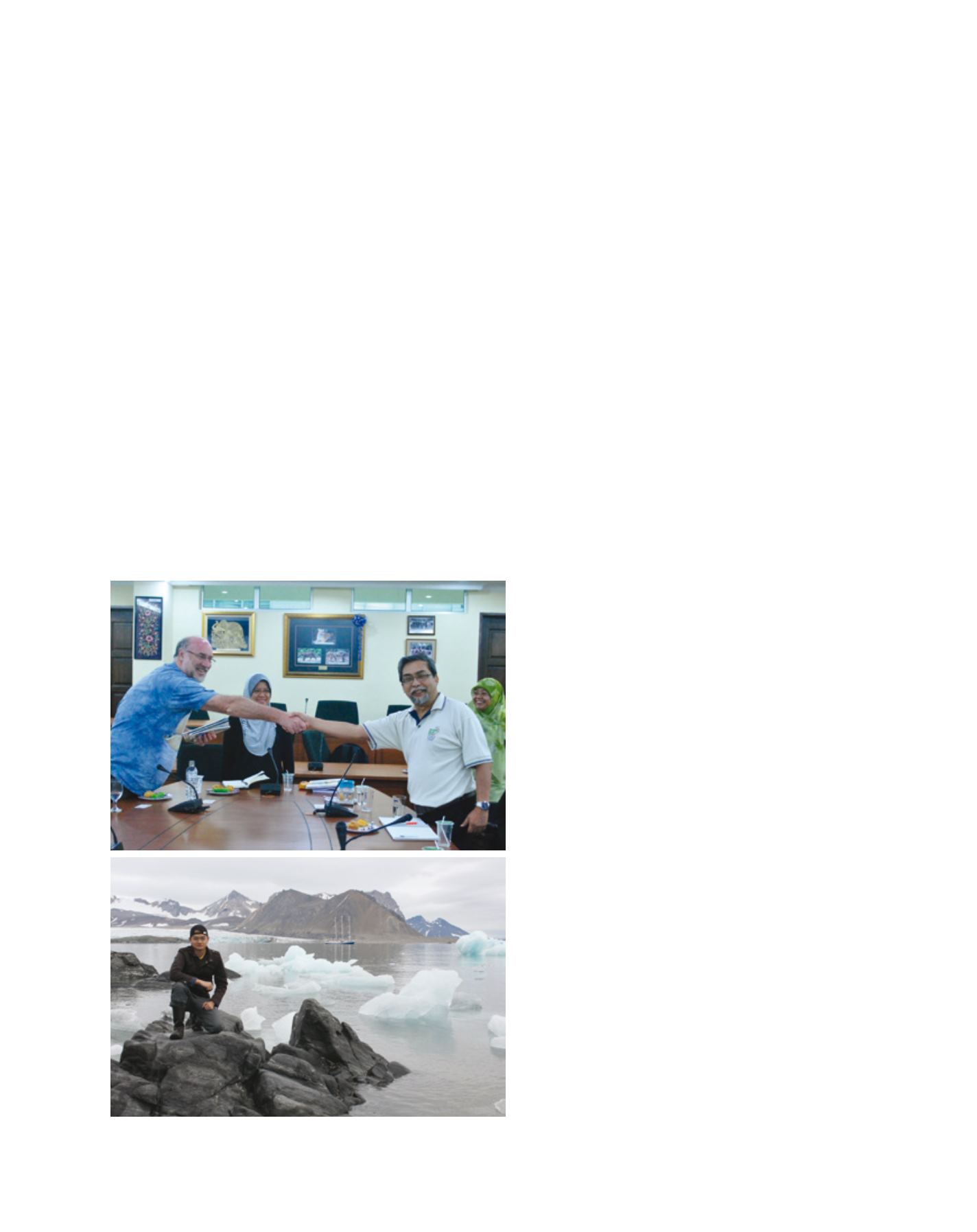

[
] 294
I
nternational
C
ooperation
on
W
ater
S
ciences
and
R
esearch
USM’s polar research
Beginning in 1983, Malaysia has strategically engaged within the
United Nations General Assembly to ensure that Antarctica is recog-
nized and safeguarded as our common heritage on Earth. Malaysia’s
interest in Antarctica was rooted in the opportunity it provides for
cooperative research of immense global scope in the areas of science,
diplomacy, management of international space, earth system and
cosmology studies, polar oceans and ice-core studies, southern ocean
research, development of early warning systems and science for inter-
national collaboration. The Malaysian Antarctic Research Programme
(MARP) was established in November 1997 following negotiations
between Malaysia and New Zealand for bilateral scientific coopera-
tion. In 2006, MARP extended its activities to the Arctic as well.
MARP’s major research interest was to establish the interrela-
tionship between equatorial and polar regions when it comes to
the causes and effects of global warming, environmental change
and impacts on the aquatic microbial community. A number of
universities in Malaysia are cooperating in this area of work. MARP
has also been organizing seminars and workshops at the national
and international levels to promote research and foster scientific
collaboration. The first biennial Malaysian International Seminar on
Antarctica (MISA) was held at Universiti Malaya in May 2002. The
sixth MISA will be held from 8-9 October 2013 at Penang.
During his visit to USM, Paul Berkman, Chair of the International
Board for the Antarctic Treaty Summit, said that the Antarctic Treaty
is often seen as a visionary precedent for governing the
‘global common’ – that is, regions and resources beyond
national jurisdictions – and that it is also very important,
with regard to the Arctic Ocean, to establish a process of
continuous policy development that explicitly promotes
cooperation and prevents discord.
As a member of the MARP team, USM has shown great
dedication to realizing MARP’s objectives to increase the
nation’s scientific capacity and research outputs. USM
is privileged to have nine researchers who have been to
Antarctica and two who have been to the Arctic.
14
At the
international level, the Foundation Director of CGSS,
Professor Datuk Seri Zakri Hamid, played a key role in the
fiftieth anniversary Summit on Science-Policy Interactions
in International Governance at the Smithsonian Institution
in Washington DC in 2009. Through its participation
CGSS@USM co-signed the ‘Forever Declaration’, one of
the major outcomes of the summit.
15
Cooperation through people-centered
decision-making
Water is our world’s most important natural resource.
It makes our planet unique among other known
planets. Given the multiple pressures on this invalu-
able resource, it is evident that in the future, water
management will have to be integrated, interdisci-
plinary and people-centred in order to minimize the
risk of water conflicts. Such conflict management will
require scientific evidence and practical value judge-
ments to secure lasting solutions. Knowledge and skills
acquired through education and work experience will
not be sufficient, by themselves, for managing sustain-
ability issues. We need in addition the ability to see
issues in perspective and to clarify and prioritize our
value systems before major decisions are made. In other
words, we need to go beyond knowledge to understand-
ing and wisdom in order to make balanced decisions
that will accommodate multiple interests in a give-
and-take manner, fully realizing that in negotiated
settlements there are always trade-offs.
16
For example, we know that communities value water
for various reasons, such as food, bathing, domestic and
spiritual uses, recreation, drainage, irrigation, industrial
production and waste removal. So long as supply and
demand are balanced, there is no conflict. When the
demand exceeds supply, tensions start. This has been the
case for millennia. What has changed is the scale: there are
many more people on Earth now, and we are approaching
water resource scarcity. This puts the various ‘water values’
listed above into competition with one another, because
allocating water resources to fulfil one value reduces the
availability of water for another. This is why we require
scientific evidence and practical value judgments to secure
lasting solutions, knowing where and how to prioritize
one value over another.
17
Decisions must be inclusive after
all views have been considered, and they must be taken in
the collective interest. We must always be open to further
iterations of the process when there are clear changes in
stakeholder priorities.
The polar@USM team in action
Images: USM polar team


















